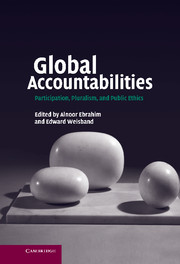Book contents
- Frontmatter
- Contents
- List of tables
- List of figures
- Acknowledgments
- List of contributors
- 1 Introduction: forging global accountabilities
- Part I Public accountability: participatory spheres from global to local
- Part II Experiments in forging NGO accountability: mutuality and context
- Part III Reflective accountability: new directions for participatory practices
- Part IV Global accountability frameworks and corporate social responsibility
- Index
Part IV - Global accountability frameworks and corporate social responsibility
Published online by Cambridge University Press: 22 September 2009
- Frontmatter
- Contents
- List of tables
- List of figures
- Acknowledgments
- List of contributors
- 1 Introduction: forging global accountabilities
- Part I Public accountability: participatory spheres from global to local
- Part II Experiments in forging NGO accountability: mutuality and context
- Part III Reflective accountability: new directions for participatory practices
- Part IV Global accountability frameworks and corporate social responsibility
- Index
Summary
The contributions in this final section shift our attention to accountability in the corporate world. One of the primary responses of the private sector to growing calls for accountability has been “corporate social responsibility” (CSR), operationalized largely through certification systems, codes of conduct, and the production of social and environmental reports. The three chapters in Part IV all examine corporate accountability efforts at network and structural levels; that is, rather than focusing on individual cases, they set their sights on analyzing regimes such as CSR, and the networks involved in creating and implementing them.
Michael MacLeod employs a social constructivist lens to chart the “rise and nature” of CSR as “an alternative, non-state source of authority in international affairs” and especially its subset of socially responsible investing (SRI) instruments. He finds that there is as yet very little evidence that links CSR to changes in corporate behavior or to improved financial performance, and argues instead that the strategic advantages of adopting CSR practices lie in a “logic of appropriateness” where companies wish to be seen as doing the right thing by global consumers, NGOs, and regulators.
Kate Macdonald concurs, and adds empirical skepticism. She finds that, in the transnational garment industry, codes of conduct selectively address concerns of consumers in the global North, while often failing to address the real interests of Southern workers. CSR efforts represent only a partial institutionalization of an accountability based on “complex reciprocity.
- Type
- Chapter
- Information
- Global AccountabilitiesParticipation, Pluralism, and Public Ethics, pp. 225 - 226Publisher: Cambridge University PressPrint publication year: 2007

